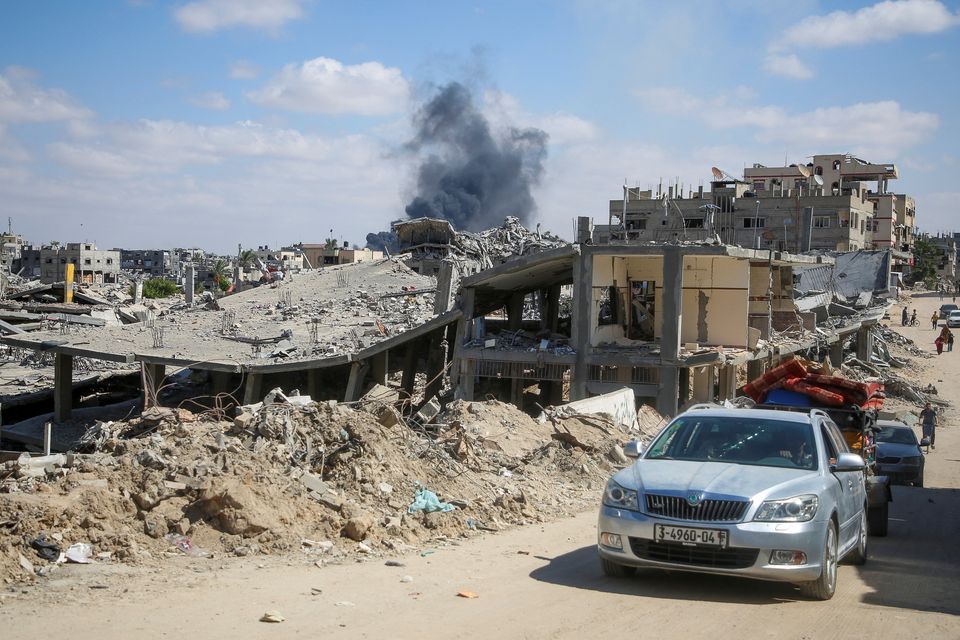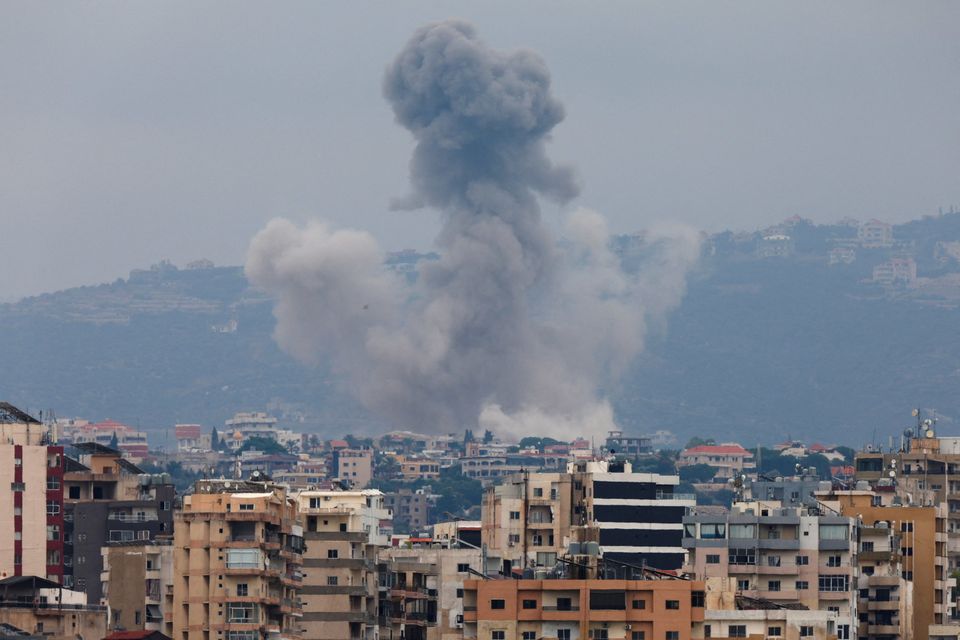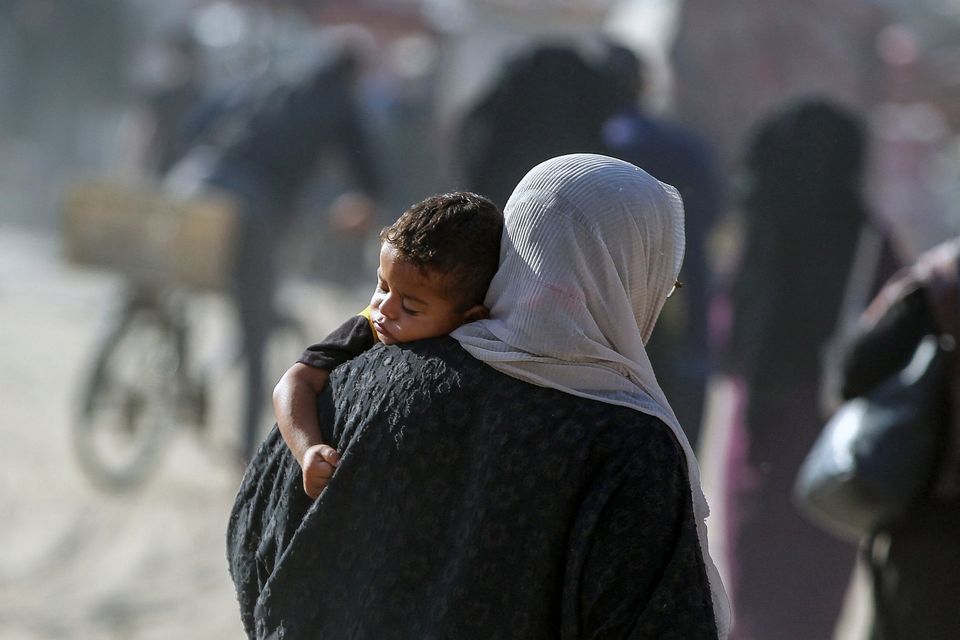A Palestinian-Irish father has told how he sings “as Gaeilge” to his “miracle” children – the sole survivors of an Israeli bomb that killed their mother in Gaza as war erupted 12 months ago.
Belfast-born Palestinian Khalid El-Astal (31) sings verses in Irish from The Dubliners’ version of Oró, Sé Do Bheatha ‘Bhaile to his son Ali (4) and daughter Sara (2), who both survived the blast that claimed the lives of their mother Ashwak (31), grandmother Hanaa (60) and uncle Majed (28).
The title of Oró, Sé Do Bheatha ‘Bhaile translates as “you are welcome home” and the lyrics resonate for the Palestinian-Irish family who are rebuilding their lives in a country that has embraced them in the wake of tragedy.
Mr El-Astal said: “It’s a year since I lost my wife, my mom and my brother, who were all killed in the beginning of the war. The fact the children survived is a miracle.
“Every day I look at Sara and I see my wife in her. Ashwak was really beautiful. But the pain hasn’t even receded by 1pc in a year.
“Ashwak was the best mom ever. She was always stronger than me. I got this strength from her. I think of her and keep hoping she’ll come back one day, although I know she died.”
The humanitarian crisis in Gaza has meant that families are unable to flee the war zone. Photos: Reuters
Yesterday marked one year since Hamas launched an attack on Israel that killed 1,200 civilians, while 250 others were taken hostage and brought to Gaza. As Israel targeted Gaza, many hoped the war would end within weeks. Over 40,000 people have been killed in Gaza.
The war has now spread into neighbouring Lebanon, where Israel has launched waves of attacks in Beirut as it says it is trying to destroy the Hezbollah terror group.
“I have a family in Ireland now,” Mr El-Astal said. “People were there for us from the start. I thank the Irish people for all they’ve done.”
Despite Ireland being a haven from war, the housing crisis has resulted in some families who have escaped conflict living in cramped accommodation.
It was horrific. When she was dying, Ashwak kept saying I must do all I can for the children
The father and children live in a one-bedroom apartment in Dún Laoghaire, south Dublin, with the children’s uncle, Mohammed Jendia (24).
Mr Jendia brought his niece and nephew from Gaza to safety in Dublin. He mourns the loss of his sister, Ashwak, who died after eight days in hospital. She had suffered burns to 70pc of her body in the bomb attack.
Despite the trauma of what happened, the family have done their best to try and move on. After only one year in Ireland, Mr Jendia is already fluent in Irish.
Mr El-Astal admires his brother-in-law’s mastering of the language, saying: “I want to speak and learn Irish too, when I have time. I’ll make sure the kids speak English and Irish.”
But right now he is getting to grips with being a lone parent, a role he has had to grow into while grieving.
The family’s affection for Irish culture is testimony to the gratitude they feel for Ireland.
Ali enjoys pre-school and watching cartoons, while Sara loves creche and Halloween treats.
A year ago, the children were in the kitchen of a Gaza apartment with their grandmother Hanaa when the bomb hit. The children fell three floors with Hanaa, who died from her injuries.
Ali and Sara were treated for serious injuries. Ashwak was in the living room with her husband’s brother, who was also killed.
“It was horrific,” Mr El-Astal said. “When she was dying, Ashwak kept saying I must do all I can for the children. I feel she’s been here with me this whole time, helping us.”
Read more
Smoke billows from a building in Tyre, southern Lebanon, where the war has spread to. Photo: Reuters
The children no longer hear the sound of bombs, but they are still deeply traumatised by what happened in Gaza. Ali has nightmares and Sara screams if her father leaves her sight.
“I’m so grateful that the Irish Government has helped us and that we have somewhere safe to live,” said Mr El-Astal.
“But there’s no room in this apartment for the four of us. There’s nowhere for the children to play, for their toys, for clothes. We sleep in one bedroom and we all need our own space.
“Every day is hard because I’m concerned for my family in Gaza and it’s difficult being without my wife.”
Mr El-Astal had been working as a graphic designer in Saudi Arabia when the bombing started.
He openly mourned on a flight from Istanbul to Dublin last year and, in his darkest hour, a stranger on the flight reached out to comfort him.
The passenger was Daithí Mac An Bhaird, from Co Kildare. He is an Irish teacher and is the reason that Mr Jendia is now fluent in Irish.
“I was so lost. It was just two days after losing my wife and a week after losing my mom and my brother. I was destroyed,” said Mr El-Astal. “Daithí has become one of my best friends. Last week, we chatted the whole night.”
Mr Mac An Bhaird’s friend, Nicola King, also from Co Kildare, shares the same birthday as Mr El-Astal’s father.
“She was born on the exact same day as my dad,” he said. “It’s like my wife is looking after us.
“I hope my father and my two brothers can be with us soon and that the Irish Government will help evacuate them.”
I don’t feel like I’m in a foreign country. I now consider Dublin my home
Mr El-Astal’s father, a former researcher at Queen’s University Belfast, and his two sons – Khalid’s brothers – were also born in Belfast. However, with the bombings and the continued attacks, very few people have been able to leave Gaza.
“Everyone must keep speaking about what’s happening in Gaza and keep protesting for peace. We just hope it comes soon,” Mr El-Astal said.
Across the capital, in north Dublin, a Palestinian couple are also struggling to come to terms with their trauma from the war and are feeling the effects of the housing crisis.
Adham Shnaino (35) is a radiologist and an Irish citizen who has worked as a painter in this country.
His wife, Waed (23), who graduated just before the war, suffers from PTSD. Ms Shnaino was evacuated on Christmas Eve last year.
The couple live in a studio flat and Mr Shnaino is concerned that the accommodation is not suitable for his wife, who is “startled” by footsteps above and on the stairs.
“It brings her back to the war,” he said. “And there’s no room for us here. If we had our families with us, we could go back to being normal human beings. We just want the war to end, for a ceasefire to happen. We have a dream for peace.”
A displaced Palestinian woman carries a child as she makes her way to flee areas in the eastern part of Khan Younis following an Israeli evacuation order. Photo: Reuters
Ms Shnaino loves to cook traditional Palestinian food and this hobby could offer the couple a future, her husband believes.
“I worry about my family,” he said. “I hope they can be evacuated, that the Irish Government can help them. And that there’ll be a ceasefire in Gaza.”
MBA scholarship student Ahmed Alsammak (28), from Gaza, also lives in north Dublin. His uncle has gone missing in recent days, and is possibly dead. His family have not found a body.
“When I told my Irish friend about my uncle, she asked me if I needed support, to let her know,” Mr Alsammak said.
“I don’t feel like I’m in a foreign country. I now consider Dublin my home. I don’t need to hide my nationality or my identity as a Palestinian here. I was born when I came to Ireland. Everyone should live in freedom like this.”
A spokesperson for the Department of Children said the Government’s aim was to “ build a more sustainable (integration) system for the longer term”.


